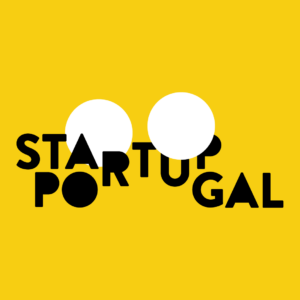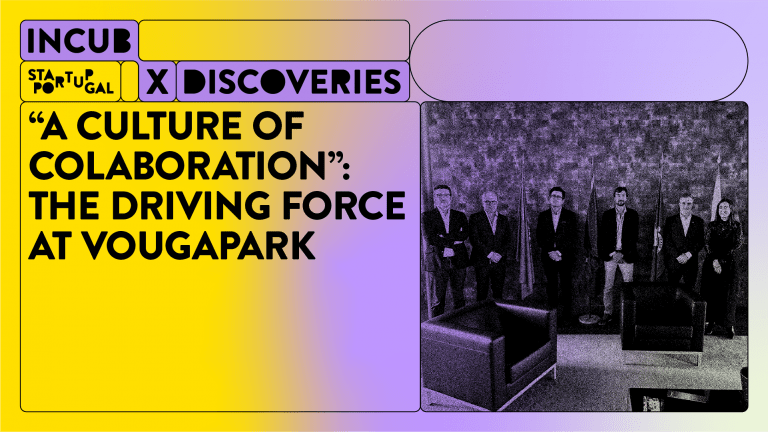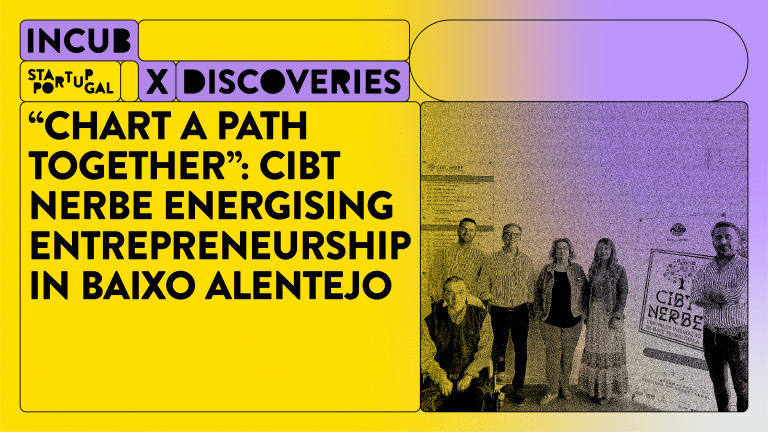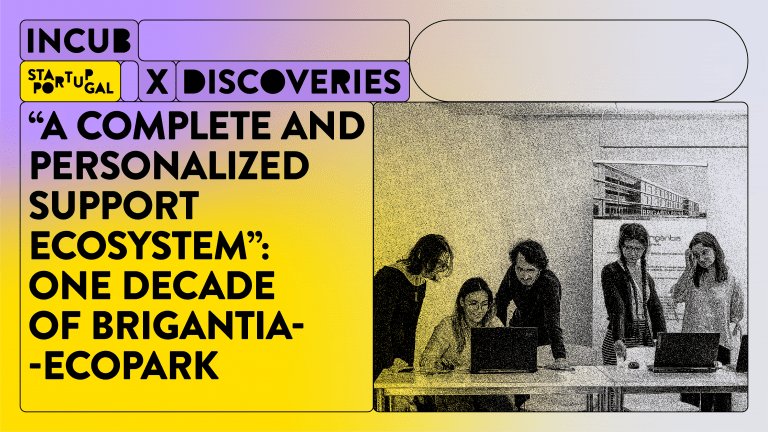“The strength of our community is remarkable”: with startUP Montemor-o-Novo
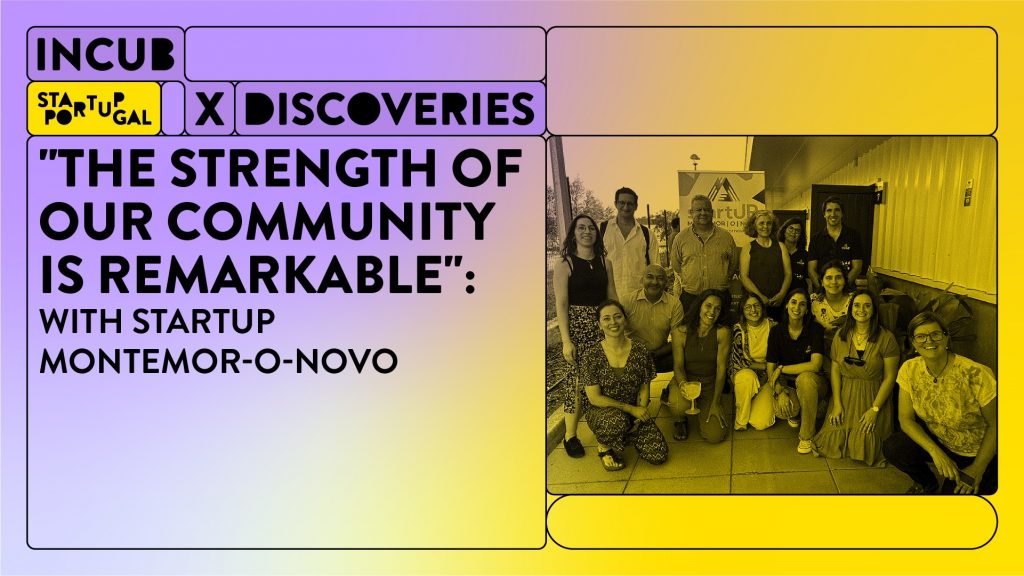
StartUP Montemor-o-Novo is committed to sustainable incubation in the heart of the Alentejo. We spoke to Teresa Biléu, Coordinator of startUP Montemor-o-Novo, and Daniel Pedreira, Head of the Planning and Economic Development Support Division at the Municipality of Montemor-o-Novo, to understand their mission and vision.
This content is available in Portuguese.
– How did startUP Montemor-o-Novo come about? What kind of projects do you incubate?
StartUP Montemor-o-Novo opened its doors in 2013, as a result of the Municipality’s desire to support the creation of new companies and stimulate the entrepreneurial spirit in the municipality. From its inauguration until June 2021, it was under the management of an external entity, and on that date it came under the exclusive management of the Municipality of Montemor-o-Novo.
In addition to the conventional coworking spaces, the incubator has 8 Box spaces with a multi-purpose industrial profile. These spaces allow us to incubate industrial projects, prototyping or small industries, such as a pottery, a distillery, a company developing equipment for industry, a company in the R&D area, a graphic arts company and a company producing paints made from bio-waste. In the coworking spaces, we welcome companies linked to marketing, design, social media management and swimming pool maintenance.
– What does your incubation model consist of?
Our incubation model is divided into three different programs, according to the needs and stage of each project.
Firstly, we have the physical incubation program in Box space, focused on companies with a production component. As well as providing box spaces, which are essential for the development of this type of activity, we offer basic services and specialized services, including logistics consultancy, designed specifically for these companies. In this modality, the technical team monitors the entrepreneurs through bi-monthly meetings.
Next, we have a program with physical incubation in a coworking space, for projects that don’t need a physical space for product or prototype development. They also have access to basic services and specialized services provided by the technical team or by external partners, such as protocol consultants or partners, adapted to their needs, such as in the area of management or accounting. In this program, we also monitor the companies, at least bi-monthly.
Finally, there is the virtual incubation program, which does not include physical space, but gives companies access to the specialized services and support mentioned above.
The 3 modalities give companies access to consultants, a network of contacts, the incubator’s and the municipality’s media, events organized by the incubator and its partners, as well as information and clarification on support and funding opportunities.
– Can you tell us the story of a startup that made a difference in the incubator? And where did incubating with you make a difference?
It’s not easy to name just one project, nor is it fair to do so, but we will mention two projects that have been incubated, have gained wings and continue to grow outside our facilities.
The first is entrepreneur Nuno Feijoca, who started out on his own in a coworking space, in the area of marketing and retailing hair cosmetics and aesthetic products. The business and the team grew and he moved into a Box space. When he left the incubator, he managed to establish himself in a 1500m2 space in Montemor-o-Novo. More recently, he has embarked on training, using the incubator’s training room for these services.
Another entrepreneur, David Figueira, started a project linked to sustainability in 2015 by selling reusable cups, also occupying a Box space. The project evolved into the development of new environmentally friendly solutions, such as ashtrays of various sizes made from bamboo. Today, Ecoality continues to market its products, but also promotes environmental awareness actions and provides consultancy services in Circular Economy, Zero Waste and Upcycling.
– Failure is also part of the journey.What do you learn most from something that didn’t go well?
Failure should be seen as a form of learning, and it is undoubtedly present in the journey of any entrepreneur (or incubator), it is what allows us to grow and improve. Failing and trying again also makes us more resilient, a much-needed trait for entrepreneurs, who along the way will have moments of doubt, anguish and considering giving up.
In the specific case of the incubator, there have already been times when we have failed and there will certainly be others in the future. One example is when we put a lot of effort into organizing an initiative, but end up not getting the expected return in terms of participation. These situations lead to an immediate feeling that we have failed in some way, which is very frustrating. The next day, we analyze what happened, find the aspects to improve and not repeat, with the conviction that we won’t give up.

– What is your incubator’s differentiating factor? In other words, what is it about you that uniquely enhances the success of the startups you incubate?
One of the differentiating factors is undoubtedly the incubator infrastructure itself, and the incubation spaces we provide, particularly the Box spaces. These spaces have a multi-purpose industrial profile, which means that an entrepreneur who needs to develop a prototype or implement a small industry can do so with all the necessary conditions, and at lower prices than those on the market. We know that many projects wouldn’t exist if our Box spaces didn’t exist.
Another differentiating factor, I’d say, is that our incubatees are always available to provide support, no matter what. The door of the technical office is always open to receive our companies, to listen to them and support them in whatever they need. There aren’t always immediate answers and solutions and we can’t always solve every need, but we always try to find a solution, either internally or through our partners.
Finally, the strength of our community is enormous. The sharing of ideas, victories, anxieties and growing pains on the one hand, and the sense of sharing each other’s resources on the other, shows that our companies know they can count on their classmate or next-door neighbor for whatever they need. This sense of community is highly valued by our entrepreneurs.
– What kind of projects or startups are you looking for now?
We currently have a 100% occupancy rate in the Box spaces, so we are focusing on attracting projects/startups that need other types of spaces and support, namely those that will use the cowork spaces, particularly projects in the areas of cultural and creative industries and the valorization of endogenous resources.
– Community is one of the factors that distinguishes an incubator from an office center. How do you look after yours and what plans do you have to make it more cohesive and fertile?
We’re very proud of our small but great community, and one of our priorities is to work on relationships with and between incubatees. This work is particularly important when startUP Montemor-o-Novo attracts entrepreneurs who aren’t from Montemor-o-Novo, who ended up moving to Montemor-o-Novo and don’t have a network of family or friends in the municipality. In these cases, it is even more important that these entrepreneurs feel welcomed and part of the community.
At the same time, we promote moments of encounter, some more or less informal, between incubatees. In fact, due to the very dynamics of the space and our companies, we end up meeting each other practically every day, for coffee, for lunch and, invariably, we end up having moments of sharing between incubatees and the incubator team. We can say that it was during a coffee break that ideas, partnerships and new products developed jointly by 2 or more incubated companies emerged.
– What are the main challenges for incubation in your specific context?
I would say that the main challenge is the lack of critical mass and the consequent difficulty in attracting projects that fit in with the incubator’s objectives. We are located in the Alentejo, a very vast region, but with a low population and business density, with equal difficulty in retaining qualified human resources, both those who could become entrepreneurs and those qualified human resources that startups want to recruit.
Within this difficulty, there is the added difficulty of attracting entrepreneurs/companies to our cowork spaces, which in our case are essentially in the area of services. These entrepreneurs see our location (the industrial zone) as being less attractive and convenient than, for example, being in the city center, something that, over time, we have proven is not quite true.
In addition, there is the challenge of always trying to do the best for the incubated entrepreneurs and, at the same time, attract new companies, with the limited human resources that make up the startUP Montemor-o-Novo team.
– Do you want to share any news with us? Any events or initiatives that we should all keep in our agendas?
In the last quarter of 2024, we will have another edition of our Entrepreneurship Month, with a program full of workshops, seminars and sessions dedicated to topics relevant to entrepreneurs and startups.
ABOUT #INCUBXDISCOVERIES
#IncubXdiscoveries is Startup Portugal’s monthly feature that will help you discover Portuguese incubators. What projects they incubate, how they manage their community and what success stories they’ve had and future projects are some of the topics covered in these interviews.
If you’d like to find out more about startUP Montemor-o-Novo, either because you’d like to see your project incubated in this region or because you’d like to establish a partnership, contact the Startup Portugal team at incubadoras@startupportugal.com.
Other blog posts
